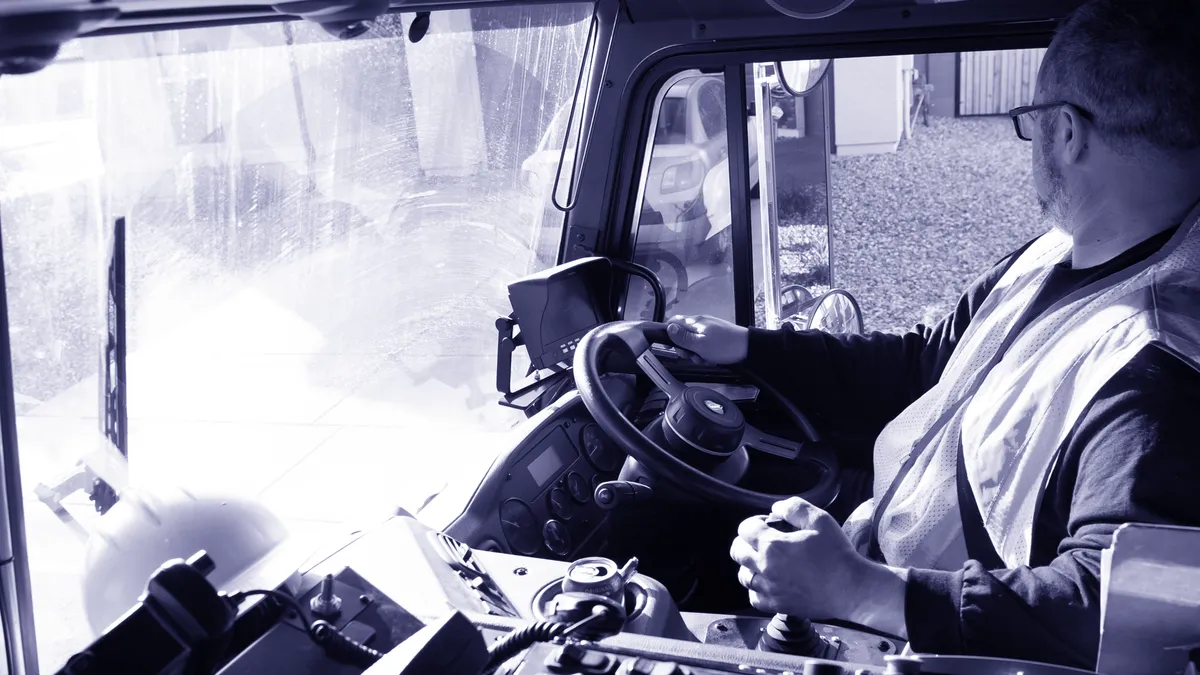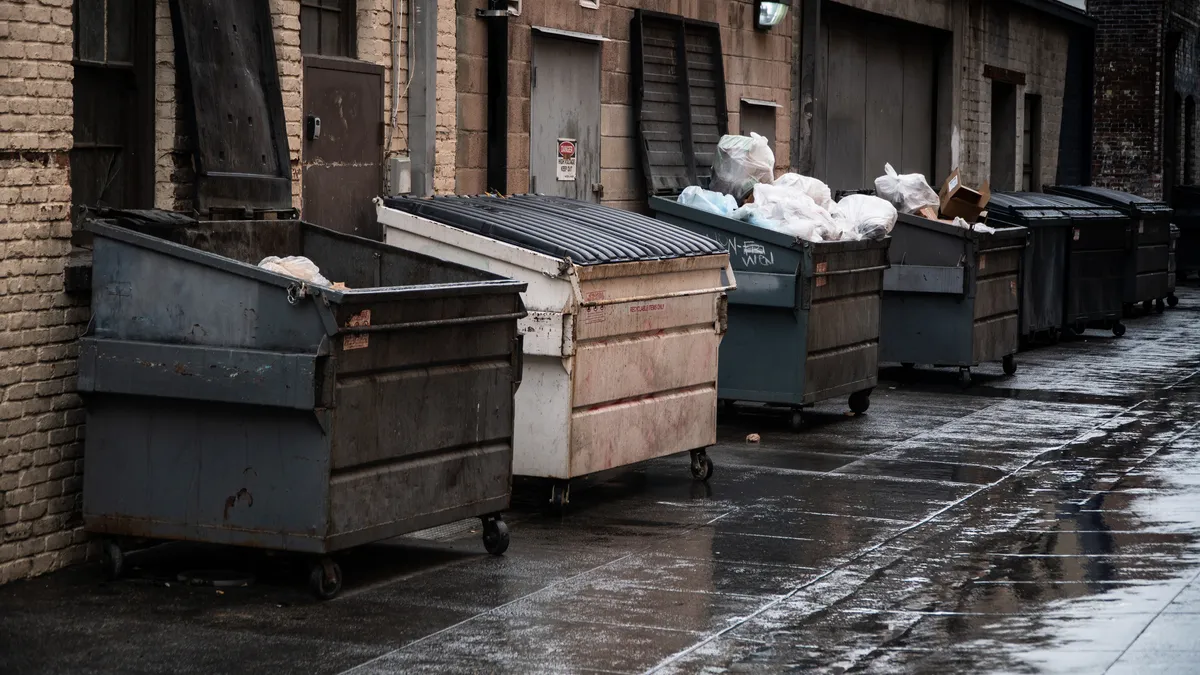City Haul is Waste Dive's ongoing series examining the people and issues shaping municipal waste and recycling across the U.S. Have a tip or an angle about city-run operations that you think should be part of the conversation? Please reach out to mrachal@industrydive.com.
Austin Resource Recovery, the Texas capital's waste utility, had about 1,200 absences in January as COVID-19 infections spread through its workforce, as well as more than 50 vacant driver positions to fill. One of the main concerns at that point, said Director Ken Snipes, was the strain on remaining staff.
With those vacancies top of mind and a busy spring season for yard waste around the corner, this week the city implemented a modified service plan. Austin Resource Recovery (ARR) preemptively announced in January that it would suspend bulk and large brush pickup until further notice to focus on trash, recycling and compost collection. Numerous other U.S. cities have made similar adjustments to bulk, yard waste or recycling services throughout the pandemic, with some changes wider-reaching and longer-lasting than others. Major examples recently include in Jacksonville, Florida; Nashville, Tennessee; and St. Louis.
Austin has had to adapt its hiring strategy during a time when Amazon and other logistics businesses have boomed. The city has increased its starting pay for drivers from $15 per hour to $17 for trainees and offers a $3,000 signing or retention bonus that pays out over two years. It's not just Austin: Denver is looking to fill 29 of its 131 driver positions and is offering $2,500 signing bonuses. Municipal leaders say that while private employers may be more nimble in adjusting pay, they point out that city jobs can offer great benefits and pensions.
“What we're trying to do is close the gap on the private-sector numbers, but we do face more challenges. It is more difficult to raise rates and to pay people more in our system," Snipes said, noting that further pay increases would require city council engagement and approval. The Austin City Council has been supportive of ARR's needs, he said, as it's easy to see the impact collection disruptions have on the community.
Because municipal waste programs vary in how they're structured and funded, there's no one-size-fits-all solution to commonly shared labor challenges. “I don't think anybody has found the silver bullet yet. We're all still struggling with it, trying to figure it out,” Snipes said.
Phoenix has been able to maintain its waste services, but it's also experienced a dearth of candidates for open positions.
“It's different today than it was where you could just say, ‘Hey, job openings here,’ and we had hundreds of applicants to choose from. It’s just not the same anymore,” said Public Works Director Joe Giudice, who also chairs the American Public Works Association Solid Waste Technical Committee. Guidice noted that his department has a flexible pay range approved for the positions it hires for, which allows it to easily hire workers higher up in that range when appropriate.
But all in all, municipal governments may be a little slower to make competitive changes. "Sometimes they don't have the flexibility. Sometimes they don't have the financial resources. Sometimes there's just processes in place to ensure accountability to the public trust for how we're spending money and things like that," Giudice noted, saying that smaller private haulers contracted to cities might face the same issue of not as easily making quick adjustments.
In addition to using new compensation approaches to attract workers, ARR is trying to make training for potential drivers more accessible. The agency is now certified by the state to offer all of its training in-house, Snipes said. Phoenix also launched a yearlong waste driver apprenticeship program a few years ago that it described as first of its kind. Apprentices get paid while they receive on-the-job training and instruction that leads to a Class A commercial driver's license (CDL), and successful completion of the program results in a job.
Austin has also turned to technology for help. The adoption of routing software and automated side loaders may lead to it “reducing a route from a three-person route to a one-person route with a fully automated truck," said Snipes. The city is also looking at single-side collection, in which residents on a given street move carts to one side of the street so a truck only has to drive down a road once, to improve efficiency.
Denver has also addressed its waste labor problems with improved routing, implementing district-based, denser collection routes at the start of the year. "This involved asking our drivers to drive new collection routes and asking 70% of our customers to set out their bins on a different day of the week," said Nancy Kuhn, public information director for the city's Department of Transportation and Infrastructure, in an email. While the city has had minor trash collection delays, Kuhn said it has not reduced service levels. "In fact, in 2022, we increased our large item collection service to every 4 weeks from an every 8 week rotation in 2021."
Cooperation regionally and with the private sector
In Fairfax County, Virginia, which runs some of its own waste operations and also contracts outside haulers, there was already a noticeable lack of available CDL drivers prior to the pandemic, according to John Kellas, the county's deputy director of public works. It temporarily halted yard waste collection as a precaution against coronavirus spread early in the pandemic.
When there were more disruptions amid haulers' staffing shortages last fall, the county also opted to allow commingling of yard waste with solid waste. While that commingling wasn't the "preferable environmental situation," Kellas said, it was a short-term solution for struggling collection operators and a public frustrated by material buildup.
"People are still paying their bills, and they're still getting charged, whether by private [companies] or municipalities," Kellas said. "Although there's an understanding that there's labor shortages and COVID impacts, as with anyone, it wears on them.”
Because public and private operators are facing similar challenges, which there have been limited opportunities to share resources or equipment.
"Everybody's hanging on by their fingernails trying to get their work done," he said. "Between private industry and our group, we've kind of ebbed and flowed with COVID going through our employee ranks." But the pandemic has resulted in increased communication between the two about how to best meet the county's needs.
"We've been meeting more regularly with our private haulers to find out what are their stress points, what can they do?" Kellas said. "Whether you're municipally served in this county, or privately served, we want that level of service to come back up where it was.”
Regional operations or collaborations may also be key. Phoenix has a mutual aid agreement with neighboring municipalities in its metro area, Giudice said. For example, it and other cities lent trucks to Scottsdale, Arizona, after a fire last year damaged or destroyed a dozen trucks in that city's fleet.
In 2019, the Solid Waste Disposal Authority of the City of Huntsville launched the Recycling Alliance of North Alabama to increase the reach of communities it serves with opt-in curbside recycling collection in the region. Executive Director John "Doc" Holladay said that being an independent authority, rather than a city or county agency, lets the operation be more comprehensive and responsive in shifting resources where needed.
Holladay also shared this tip: A common routing software or turn-by-turn navigation system across regional partners could make it easier to collaborate or exchange resources when needed. He also noted that a four-day collection schedule leaves a day for maintenance, a strategy Denver's Kuhn said the city recently embraced to catch up on illegal dumping complaints or other services without requiring weekend or overtime work.
Resilience and forecasting
The challenging operating environment in the last two years has highlighted the need for more resilience planning going forward to prepare for whatever's next.
“One of the things we're looking at is support systems," Kellas said, to help cope when internal human and fleet resources are not sufficient. Fairfax County has contracts with leasing companies, for instance, in case they need to bring in equipment, "just to have more of a safety net to supplement these ebbs and flows as they come."
Giudice said the Phoenix Public Works Department will do "future-casting" exercises to consider technology coming down the pike and how that and other industry trends could influence staffing needs in future years.
“You have to keep your pulse on where things are headed so you can be responsive and you can be planning,” Giudice said. That was how the apprentice program for drivers came to be a few years ago, he said — the city anticipated it would need to grow its own employees. At the same time, the emerging need for maintaining robotics or automation technology, for instance, can create new types of jobs. And further in the future, Phoenix is keeping an eye on the potential role of autonomous trucks.
For now, labor costs may continue to mount for employers and for customers. During fourth-quarter earnings calls, major waste and recycling companies noted greater labor spending, exacerbated by inflation, which has translated to price increases. Jeff Duhamel, CEO of California-focused solid waste and recycling consulting firm MuniEnvironmental, said contracts he’s recently helped negotiate between haulers and cities have had rate increases between 30% and 40%. In California, he attributed the increases to a combination of factors, including rising labor costs, but also rising fuel costs and costs associated with organics recycling programs newly required by state law SB 1383.
Ultimately, Austin's Snipes sees the current moment as “a reckoning in terms of what we want to value the position of a truck driver as," he said. "I think we just have to pay more and understand that that's just the nature of the business. It's a high-demand job, and we're starting to see people move around and take advantage of what they may perceive as better opportunities out there."






















